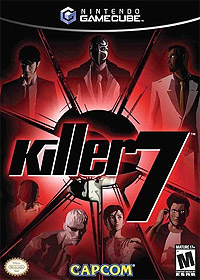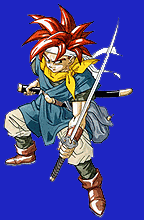
The Nightmare of Druaga: Fushigino Dungeon

| The Breakdown | |
|---|---|
| System: | Gamecube Playstation 2 |
| Publisher: | Capcom |
| ESRB rating: | Mature |
Capcom is one of the most schizophrenic companies in the game industry. One the one hand, they are far and away the worst perpetrator of reliance on sequels. Last I checked, there are on the order of ninety-six Mega Man titles in existence (quite possibly counting re-releases, but that's neither here nor there). Let me say that again, because it bears repeating: There are on the order of ninety-six Mega Man titles in existence. They somehow stretched a B-grade game like Dino Crisis into a three game franchise. As partial as I am to Street Fighter - both the Alpha and Vs. series in particular - there are dozens too many versions out there.
On the other hand, every once in a while Capcom throws us some curveballs and offers up something different and unexpected. Something that, even if not totally successful, is something strikingly original and fresh. Killer 7 is one of those titles.
A quick history lesson: Way back in late 2002, Capcom announced five new titles for the Gamecube, four of which were wholly original: Project Number 03, Dead Phoenix, Killer 7, Viewtiful Joe, and the one sequel of the lot, Resident Evil 4. While the first two games didn't fare so well - Project Number 03 was a critical and commercial failure and Dead Phoenix was eventually cancelled - the remaining three were more promising. Killer 7 was always the most mysterious of the vaunted "Capcom 5", however. As Viewtiful Joe, Resident Evil 4, and even a sequel to Viewtiful Joe were released with much success, Killer 7 kept getting pushed further and further back, and every trailer and screenshot released in the meantime did little to reveal even basic details about the gameplay. The game was finally released this past July, and well...it bombed. Pretty badly, in fact.
In the end I'm not that surprised, though. From the moment I saw the first couple trailers, I had the feeling that this was going to be exactly the type of game that critics were always saying they wanted because it broke the mold, yet that nobody would buy precisely because it broke the mold. It's hard to blame them, though. It's a really, really hard game to wrap your head around. You basically play as the seven different personalities of a wheelchair-bound assassin named Harman Smith. A terrorist organization known as the Heaven Smile has made itself known and it's up to the Killer 7 to put a stop to it. Governmental and political intrigue between Japan and the United States is the order of the day, and vague moral, ethical, and philosophical ponderings are the side dish. Each character is a personality yet they interact with the real world with no problem. Televisions and video cameras govern which personality is used. Blood, which you collect upon properly defeating your enemies, is used for both healing and leveling up. If Harman's personal assistant is dressed as a maid, she'll let you save your game, but if she's straddling her chair while wearing daisy dukes, she'll completely ignore you. Like I said, it's really hard to wrap your head around.
Which brings me to my next point. I am completely in love with Killer 7's sense of style. Capcom has made excellent use of cel shading to create what is essentially an interactive noir graphic novel. The graphics are minimalist, emphasizing the sharp lines at which darkness and light meet. The characters are eccentric almost to the point of absurdity. (Kaede Smith, who runs barefoot in a blood-soaked dress, has the special power of slashing her wrists and using the resulting shower of blood to clear obstructions. Mask de Smith is a masked wrestler who blows through walls and head butts bullets.) If you defeat an enemy properly (by targeting their weak point), a random phrase like "All you need is blood!" or "Got blood?" appears in the top right corner of the screen for a couple seconds. When you come upon an area with multiple paths (I believe the game calls them "junctions"), each path is presented to you onscreen by an icon that resembles a shard of glass that gradually fades in as you approach it. Were Killer 7 not a game but a movie, I'd be temped to give it an easy 9.5 right off the bat. The fact that you're the one who has to control these characters doesn't make the issue that cut and dried.
On second thought, it's not the fact that you have to control the characters. They're an intriguing bunch. I enjoy hearing Coyote Smith growl "You're fucked!" as I collect the blood from my fallen enemy. I like directing Garcian Smith (the "Cleaner") to the character I just died as, so he can bring their bagged remains back to Harman's room for resurrection. It's the control scheme that takes more than some getting used to. For reference, I'm using the Gamecube control scheme and button names but the Playstation 2 control scheme is the same. Your movements are essentially on rails. You hold down the A button to run, then when you come upon a junction, you hold the control stick in the direction of the junction and hold A to proceed. Most enemies are initially invisible and only inform you of their presence through semi-sane laughter. When an enemy is encountered, the R button is held to switch into first person mode and the L button is used to "scan", which makes the enemy and its weak point visible. While continuing to hold the R button to stay in first person mode, pressing A will fire. Reloading is automatic, or can be achieved automatically by pressing up on the C stick. Suffice to say, the controls are far from traditional. They are also not very intuitive at first, although with a couple hours of practice you'll be aiming and shooting with the best of them.
That is, if you can make it that far. It's obvious from the outset that this is not a game for everyone. You know those people who don't like Neon Genesis Evangelion because they can't stand the series' penchant for speaking in metaphors and how deliberate it often is in obscuring the truth through strange and inexplicable imagery? They're probably not going to have a good time with Killer 7. The NPCs you meet throughout the levels have a way of seeming like they're revealing important information, but only if you can weed through their recollections of their twisted childhoods. I'm certain the game has some profound points to make, particularly on the political and economic relations between the United States and Japan, but much of it is (intentionally) revealed through a sort of funhouse mirror, distorting it. Of course, this is the point. But if you're the type that doesn't enjoy having your head messed with, you might want to pass on this.
While not succeeding on all levels, it's hard for me to think of any serious flaw in Killer 7. From a technical standpoint, nearly all of Capcom's offerings are top notch, and this game is no exception. From its impeccable style to its unconventional mechanics, Killer 7 is truly the unique experience that Capcom promised, and is a perfect example of what the company is capable of when it actually strikes out into new territory.
